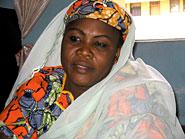Signs of the end - Hope for Polio Eradication in Taraba state, North-East Nigeria
24 July 2006 -- Sardauna Local Government Area (LGA), home of the Mambilla Plateau – famous for its unique settlers, steep inclines, lush vegetation and temperate weather, is one of the five hardest to reach areas in Taraba, a state which despite its geography, appears set to declare victory in the task of eradicating poliomyelitis from Nigeria. Since July 2005, the state has not had a confirmed case of the wild polio virus, in spite of that year’s tally of 133 acute flaccid paralysis cases, and 25 cases as at June 9, 2006.
State Health Commissioner, Dr. Jonah Wachap Sam is excited by the strides the state has made in eradication activities and early signs that the state is bidding the scourge goodbye. Many things, note the commissioner, are working in favour of eradication efforts. These include the enthusiasm of stakeholders, the working relationship between the Ministries of Health, Local Government, Education, Information and Women Affairs and a mechanism for ensuring that those who are trained are the ones who implement. Others are the involvement of the state political and ministerial leadership in supervision, timely payment of sweep group members, and the full utilization of a social mobilization structure down to the community level.
The concerted efforts to eradicate polio, has according to WHO’s Dr. Andre Lukusa, witnessed the emergence of, among others, the Galadima of Muri and Hajia Samira Yusuf Bako, Director, PHC, in the Ministry of Local Government and Chieftaincy Affairs, as key in providing the link to the LGA chairmen who are crucial to planning and implementation efforts. The Galadima who chairs the state social mobilization committee, continues to show unbounded enthusiasm in addressing challenges whenever they arise.
Hajia Bako is reluctant to take credit for her contributions. The nurse and administrator who is always available when required, has helped with convincing even some evasive local political leaders. She recounts how she “disturbs” uncooperative chairmen till they provide required financial and logistic support. She also insists on supervising problem areas, using the opportunity of being physically in the location to address challenges.
Hajia Bako is impressed with the level of cooperation by chairmen of Wukari, Bali, Yorro, Gashaka, Lau and Ussa LGAs, but singled out Josiah Adi, a former health worker and ex-chairman of Wukari LGA as outstanding in the provision of support. The change from the mechanism which allowed for deductions of LGA financial support from the state level to one where the LGAs now have direct control, is one challenge that Hajia Bako is addressing well with the support of other key players. She is undaunted and ready to continue even when she occasionally relies on personal resources.
Her zeal may have affected another woman – Joyce Makapi Daniel, Director PHC of Song LGA, in neighbouring Adamawa State, who is also living up to the challenge of mobilizing human and available material resources to rid the area of the wild polio virus and strengthen disease surveillance. The LGA has reported the highest number of acute flaccid paralysis cases in the state this year, with none of them confirmed as wild polio virus.
- By Nosa Owens-Ibie



